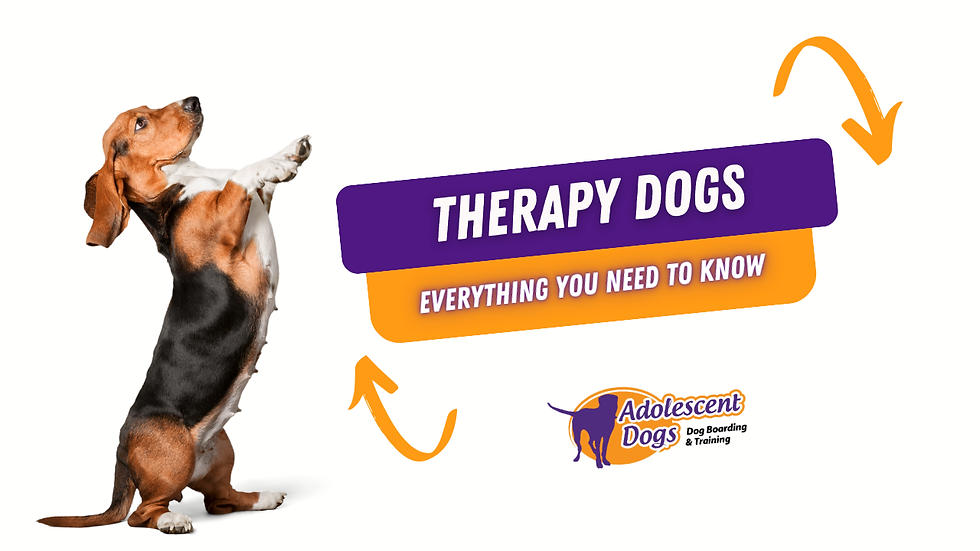🐾 Therapy Dogs: Everything You Need to Know
- Adolescent Dogs

- Sep 12, 2025
- 3 min read

Therapy dogs are more than just loving pets — they’re four-legged ambassadors of comfort, connection, and care. From care homes to classrooms, they brighten days, ease anxiety, and bring people together through the simple power of companionship.
In this blog, we’ll explore what a therapy dog is, who they help, the qualities they need, and how you and your dog can become a certified therapy team with the Adolescent Dogs programme.
🌟 What is a Therapy Dog?
A therapy dog is a calm, friendly, and well-trained companion who works alongside their handler to visit people in settings such as:
Care homes
Hospitals
Schools
Libraries
Community centres
Their role is to create positive interactions, help reduce stress, and improve wellbeing. Unlike assistance dogs, which are trained to help one person with specific disability-related tasks, therapy dogs provide comfort and support to many people in a variety of environments.
💖 How Do Therapy Dogs Help?
The presence of a therapy dog can make a real difference — emotionally, physically, and socially.
🏥 In Healthcare Settings
Reduces patient anxiety and stress
Provides comfort during long hospital stays
Encourages movement and physical activity (e.g., reaching to stroke the dog, walking alongside them)
🧠 In Mental Health Support
Eases feelings of loneliness and isolation
Helps lower blood pressure and heart rate
Encourages relaxation through gentle interaction
🎓 In Schools & Education
Boosts children’s confidence, particularly in reading and speaking
Helps students manage anxiety
Teaches empathy, kindness, and responsibility
🏡 In the Community
Encourages conversation and social connections
Brings joy to people who may be experiencing difficult circumstances
Supports wellbeing in group programmes, therapy groups, and outreach events
🐕 Who Can Become a Therapy Dog?
There’s no single “therapy dog breed” — dogs of all shapes and sizes can do this work, as long as they have the right temperament and training.
Ideal Therapy Dog Qualities:
Calm and friendly around strangers
Comfortable being handled and petted
Well-behaved in public spaces
Confident in new environments with various sounds, smells, and sights
Responsive to their handler’s cues
If your dog is happiest when meeting new people and enjoys a calm, steady pace, they may be a great candidate.
👩🏫 Who Can Be a Handler?
Almost anyone over 16 can be a therapy dog handler, provided they can:
Safely control their dog in public
Commit to maintaining their dog’s training and welfare
Respect the policies of venues they visit
Therapy dog work is a partnership — your role as a handler is just as important as your dog’s role.
📝 How to Become a Certified Therapy Dog Team
With the Adolescent Dogs Certified Therapy Dog Programme, you can train your own pet dog to meet our professional standards and gain official certification.
Here’s the process:
Join the programme – Annual membership is £99, which includes your ID card and online assessments.
Pass the Therapy Dog Obedience Award – Shows your dog has good manners and control.
Pass a Temperament Assessment – Conducted annually by a local force-free trainer using our official criteria.
Maintain standards – Keep your insurance, DBS check, and temperament assessments up to date.
Optional: Our Online Academy (additional cost) gives you access to over 450 training videos and 7-day trainer support to prepare for your assessments.
📌 Why Our Programme Works
We combine professional dog training expertise with a flexible approach:
Professional – Our assessments are clear, measurable, and designed for real-world therapy work.
Accessible – Temperament tests can be completed with a local trainer to you.
Comprehensive – We test for both temperament and obedience, not just one.
Supportive – You’ll have the option to access ongoing training and expert help.
❤️ Final Thoughts
Therapy dogs don’t just make people smile — they can lower stress, spark conversation, encourage movement, and create moments of connection that last long after the visit ends.
If your dog loves people and you’d like to make a difference, joining the Adolescent Dogs Certified Therapy Dog Programme could be the perfect next step.
📩 Ready to start your therapy dog journey? [Click here to join today]
Together, we can spread comfort, joy, and connection — one paw at a time. 🐾









Comments